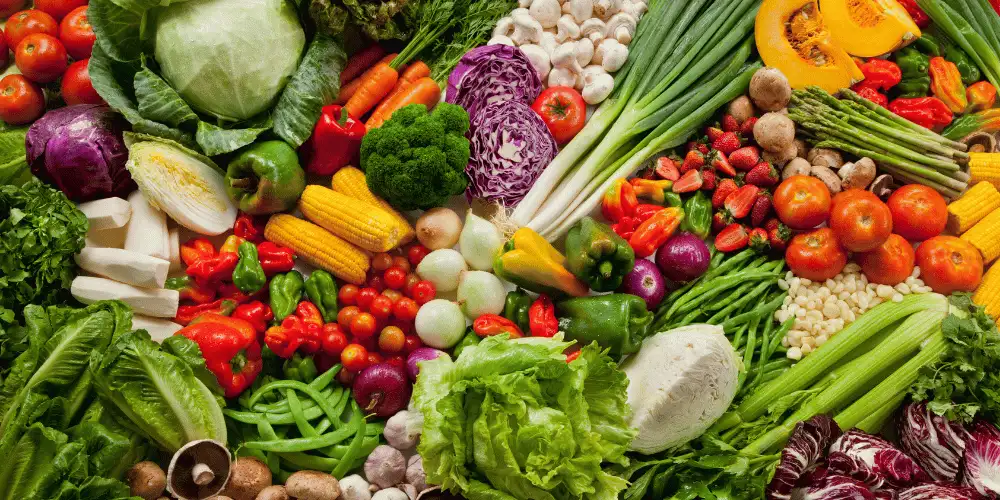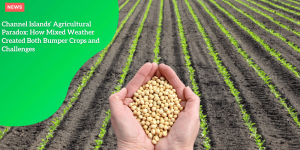Breaking: How Climate Breakdown Is Creating a Critical Shortage of British Brassicas
Anúncios
Current Crisis Overview
The United Kingdom is grappling with a significant shortage of broccoli and cauliflower, two staple vegetables that are paramount in British diets.
This issue primarily stems from unusual weather patterns that have disrupted the normal growth cycles of these crops.
Anúncios
Unusual Weather Patterns
Over the past few months, the UK has experienced heavy autumn rainfall followed by unseasonably mild temperatures.
These conditions have caused a premature maturation of winter vegetables, including broccoli and cauliflower.
Anúncios
Normally, these crops would be harvested in the spring, but the atypical weather has brought them to readiness much earlier.
As a result, there will be fewer vegetables to pick during the usual harvesting season.
Furthermore, the mild temperatures have not only accelerated growth but also contributed to other agricultural challenges.
The extended wet conditions have led to increased slug damage on unprotected plants, further reducing the available yield.
Lengthening the ‘Hungry Gap’
The anticipated shortage of these vegetables is expected to extend the UK’s traditional ‘hungry gap.’
This period, typically spanning from April to early June, is notorious for having a scarcity of locally grown produce.
With early crop maturation and resulting losses, the gap is likely to be even more pronounced this year.
This issue is compounded by import complications from the continent.
Heavy rainfall in Spain has caused significant quality issues and planting delays for winter broccoli.
Additionally, flooding in other parts of Europe has disrupted normal planting schedules, potentially creating a gap in vegetable availability in late spring.
 The number of vegetables will decrease
The number of vegetables will decrease
Industry Concerns and Recommendations
Agricultural experts have raised alarms about the worsening conditions.
Hannah Croft, an agronomist at Riverford, highlighted the challenges faced by UK cauliflowers due to the considerable rainfall and mild autumn temperatures.
She also pointed out the setbacks faced by Spanish suppliers, emphasizing the potential gaps in vegetable availability.
Agronomists recommend turning to alternative vegetables such as spring greens and other cabbages to mitigate the impact.
This shift could help fill the void left by the shortage of broccoli and cauliflower.
As the UK faces these immediate challenges, it becomes evident that adapting agricultural practices is becoming increasingly necessary.
Climate change’s impact on farming is undeniable, and the current crisis underscores the urgency of planning for new crop varieties and adjusting agricultural schedules.
This all paints a clear picture of the critical state of the UK’s vegetable supply chain and the intricate web of factors influencing it.
Weather-Related Challenges
The UK agriculture sector is experiencing significant challenges brought on by unusual weather patterns.
These weather-related obstacles are affecting the growth and yield of key vegetables, particularly broccoli and cauliflower.
Heavy Autumn Rainfall
One of the primary challenges has been the heavy rainfall during autumn.
This excessive rain has led to waterlogged fields, which adversely affected the early crops.
The saturated soil conditions not only impacted the root development of growing plants but also increased the risk of fungal diseases.
Many early broccoli and cauliflower crops were lost, leaving a gap in the expected yield.
Mild Temperatures
Adding to the woes, the UK experienced unseasonably mild temperatures during the winter months.
While such conditions might seem beneficial at first glance, they have forced winter vegetables to mature ahead of schedule.
Cauliflowers that should have been ready for harvest in spring were suddenly ready during winter.
This premature maturation creates a supply gap when these vegetables would typically be harvested and available in the market.
Increased Slug Damage
As if early maturation wasn’t enough, the excessively wet conditions have also resulted in a surge of slug populations.
Slugs thrive in damp environments, and unprotected plants became an easy target.
The damage caused by these pests is another factor contributing to the reduced availability of broccoli and cauliflower.
Reports indicate entire crops were destroyed by slugs, further exacerbating the shortage.
Overall, the combination of heavy autumn rains, mild winter temperatures, and increased slug populations has created a perfect storm for UK brassicas.
This cocktail of adverse weather conditions and pest issues is not only causing immediate shortages but is also raising concerns about the future sustainability of these crops in the UK climate.
These challenges underscore the pressing need for UK agriculture to adapt to changing weather patterns and rethink its approach to crop protection and planning.
Moving forward, addressing import complications and finding sustainable solutions for consistent vegetable supply will be crucial.
Import Complications
With the UK already reeling under the pressure of unusual weather-related challenges, import complications are adding to the crisis.
Typically, during the traditional ‘hungry gap’ between April and June, the UK relies heavily on imports from Europe to fill the void left by its own early-maturing crops.
However, this year, the situation is particularly grim.
Spanish Setbacks
Spain, one of the UK’s primary winter vegetable suppliers, is facing significant setbacks.
Heavy autumn rain in Spain has wreaked havoc on crop quality.
The deluge not only led to immediate damage but also delayed planting schedules for spring crops.
This cascading effect means that the usual steady supply of Spanish vegetables is stymied, creating a potential gap during late spring when the UK traditionally relies on these imports.
Flooding Across Europe
It’s not just Spain facing troubles. Flooding has disrupted the agricultural rhythm across continental Europe.
In many key growing areas, the persistent waterlogged conditions have pushed back normal planting schedules.
Countries that would typically supply vegetables to the UK are themselves dealing with significant agricultural challenges.
Flooded fields mean that farmers are unable to plant crops in time, leading to further delays and potential shortages down the line.
Spring Shortfalls
The combined effect of these setbacks is a looming gap in the availability of late spring vegetables.
Given the reliance on European imports to bridge the ‘hungry gap,’ the forecasted shortages mean it will be harder, if not impossible, to source essential vegetables such as broccoli and cauliflower during this critical period.
The heavy autumn rains and subsequent flooding have caused ripples throughout the supply chain, creating a scenario where UK consumers may face sparse vegetable aisles.
As the situation develops, it underscores the pressing need for greater adaptability in agricultural practices.
While we can hope for more favorable conditions, planning for these kinds of disruptions is becoming increasingly critical.
The next chapter will delve deeper into the broader implications of climate change on UK agriculture, further highlighting the need for strategic changes and long-term solutions to ensure a stable food supply.
Climate Change Impact on UK Agriculture
Met Office Warnings About Changing Farming Conditions
Climate change is profoundly altering the landscape of UK agriculture, presenting new and significant challenges.
The Met Office has warned that the nation’s farming sector will be increasingly impacted by hotter weather and other shifting climatic conditions.
Challenges with Water Availability and Temperature Variations
As temperatures rise, the availability of water, which is already a crucial resource, becomes even more strained.
Water shortages and droughts are expected to become more frequent, posing a severe threat to the predictability upon which farming relies.
Higher CO2 levels in the atmosphere might seem to offer some advantages by stimulating plant growth, but this is offset by the complexity of water management.
While a warmer climate could allow the cultivation of new crops, it also makes water access harder, particularly during the growing season.
Potential Unsuitability of Current Crops for Future Climate Conditions
The higher temperatures and altered rainfall patterns render some of the current crop types increasingly unsuitable.
As highlighted by the Met Office, crops that presently thrive under the existing conditions may struggle to survive or produce optimal yields under a future climate regime.
For instance, crops like broccoli and cauliflower, which are staples in the British diet, are particularly vulnerable.
Recent weather patterns have already shown how susceptible these crops are to premature maturation and slug damage.
If these trends continue, certain vegetables could become exceedingly difficult to cultivate reliably in the UK.
The ramifications of these climatic changes are extensive, touching not only on the types of crops that can be farmed but also on agricultural planning and water resource management strategies.
The importance of adapting to these changes is critical for food security and sustainable farming practices.
The shifts in farming conditions and the urgency for adaptable agricultural strategies highlight how climate change requires a proactive approach in UK agriculture.
Adaptation and Solutions
Recommendations for Alternative Vegetables
To combat the ongoing climate-induced disruption to traditional brassica crops like broccoli and cauliflower, experts recommend incorporating alternative vegetables into both agriculture and diet.
This adaptation could significantly ease the impact of the extended ‘hungry gap.’
Spring greens and various cabbages present viable substitutes.
These vegetables are robust and can tolerate the fluctuating weather conditions currently challenging UK agriculture.
Their adaptability to varied conditions means they can be successfully harvested during times when traditional brassicas might falter. According to The Guardian, agronomist Hannah Croft at Riverford has suggested these alternatives for replacing brassicas.
Agricultural Planning Adjustments
Adapting to the unpredictable weather patterns necessitates revisiting and revising agricultural planning strategies.
Farmers should consider:
- Diversifying Crops: Growing a broader range of vegetables can spread the risk. Different crops are affected differently by various weather conditions, lessening the blow from any single climatic anomaly.
- Staggered Plantings: Implementing staggered planting schedules can prevent simultaneous cropping issues. This strategy can evade the problem of early or delayed maturations caused by unusual weather patterns.
- Improved Pest Management: Due to increased slug damage from wet conditions, enhanced pest management techniques should be incorporated. Protecting crops from pests through organic and structural measures can help sustain crop yields.
Considering New Crop Varieties
In response to the changing climate, the suitability of current crop varieties under new conditions needs careful assessment. The UK farmers could benefit from exploring new crop varieties specifically bred for resilience to climate change.
- Climate-Resilient Breeds: Agricultural research is continually progressing towards developing crop varieties that can withstand higher temperatures and irregular water supply. Investing and participating in these advancements will be crucial.
- Water-Efficient Varieties: With potential water shortages looming, selecting crop varieties that require less water without compromising yield will be a vital step in sustainable agricultural practices.
Taking these measures now will not only help mitigate the immediate impacts of current climatic challenges but also prepare the agricultural sector for a more resilient future.
Adopting alternative vegetables, adjusting agricultural planning, and considering new crop varieties will set a foundation for more adaptable and sustainable farming practices moving forward.






